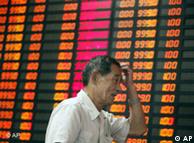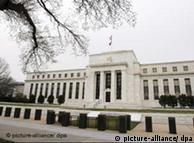ECONOMY | 02.03.2011
Investors become wary of emerging economies
Finance ministers and central bankers in a number of emerging economies knew trouble was around the corner. Until recently, financial managers appeared fixated on the attractive investment opportunities in emerging markets. But nations like Brazil and China were reluctant to accept the surge the foreign capital, and now that unrest has spread throughout the Arab world, their reasons have become clear.
Maria-Laura Lanzeni, an analyst with Deutsche Bank Research, says international investors are pulling their capital out of many emerging economies, even though they may not be connected to the Arab world.
"I believe it is a structural problem with some investment groups that invest in emerging economies," she told Deutsche Welle. Many of those groups invested based on a trend but knew little about the countries' actual economies, she added.
But the problem extends beyond investors whose decision to pump cash into emerging economies was based purely on the prospect of high returns, Lanzeni believes. She says a structural problem exists within the financial products themselves, because they are organized in blocks.
Next please
 South Korea has also suffered under its status as one of the 'Next 11' emerging economiesFollowing the success of investment vehicles focusing on the so-called BRIC states (Brazil, Russia, India and China), investors identified further opportunities in a group of emerging economies dubbed the "Next 11," which includes Egypt, South Korea, Mexico, and Turkey. When political unrest in Egypt caused nervous investors to transfer their capital to safer markets in January, the other 10 members of the Next 11 were also affected.
South Korea has also suffered under its status as one of the 'Next 11' emerging economiesFollowing the success of investment vehicles focusing on the so-called BRIC states (Brazil, Russia, India and China), investors identified further opportunities in a group of emerging economies dubbed the "Next 11," which includes Egypt, South Korea, Mexico, and Turkey. When political unrest in Egypt caused nervous investors to transfer their capital to safer markets in January, the other 10 members of the Next 11 were also affected.Others see it differently, though. For Robert Halver of Baader Bank, unrest throughout the Middle East isn't a genuine problem for stock markets in emerging economies. If crucial oil supplies are affected, though, "then the fun is over," he said.
Inflation fears
Another factor that prompted the withdrawal of more than 7.2 billion euros ($10 billion) from stock markets in emerging economies last month is a growing fear of inflation.
"We believe the notion of inflation is a much more important risk," said Christian Preussner of JP Morgan Asset Management.
Food prices have become the number-one inflation driver over the past 18 months, he added. By comparison, raw materials, real estate and non-food consumer products have been subject to significantly less price pressure.
According to Preussner, droughts in a number of developing nations have exacerbated the situation in recent months. Reduced crop yields have cut export revenues and increased their reliance on food imports.
Baader Bank's Halver lays the blame for rising food prices at the doorstep of the United States' Federal Reserve, whose "quantitative easing" program has flooded markets with enough cash to create asset bubbles and spur on speculation on food and raw materials.
Countries like Brazil, Indonesia, India and, finally, China, recognized the problem of inflation and raised interest rates.
"Meanwhile the United States let inflation run away," Halver said. "Allowing inflation is always a great way to reduce the national debt."
Halver added the comparatively high interest rates in emerging economies poisoned those stock markets.
Established markets are back
While low interest rates have helped stock markets in established industrial economies rebound, so too have extensive stimulus programs. Economic growth in the United States and in Germany - the European Union's biggest economy - has exceeded post-recession expectations. Consumer confidence is also increasing, which is another reason stock markets in industrialized economies have become attractive to investors again.
The MSCI World Index, which tracks development in all major established stock exchanges, has registered growth of 4 percent since the beginning of the year. Meanwhile the MSCI Emerging Markets Index, which tracks stock exchanges in emerging economies, posted a loss of 5 percent.
To make matters more difficult for emerging economies, many investors have figured out they can invest in companies traded on American or European stock exchanges and still benefit from positive developments worldwide. That's because companies listed there often generate much of their turnover in emerging markets, according to Halver.
 Lanzeni says a domino effect is unlikelyNo hype, but no flight
Lanzeni says a domino effect is unlikelyNo hype, but no flightEven though the hype surrounding emerging economies has subsided, Deutsche Bank Research's Lanzeni says she is not concerned about a sellout similar to that of the 1997 Asian crisis.
At the time, the Thai baht collapsed and caused a currency and economic crisis in Asia. A chain reaction dragged down oil prices and struck the Russian economy. Meanwhile, some South American countries nearly became insolvent as cautious investors pulled back massive amounts of capital.
Today, however, "countries have huge currency exchange reserves and a much better structure in their external debts and financial situations," Lanzeni said. "They've done many good things in the meantime."
Author: Jutta Wasserrab (gps)
Editor: Sam Edmonds
Editor: Sam Edmonds
dw



No comments:
Post a Comment